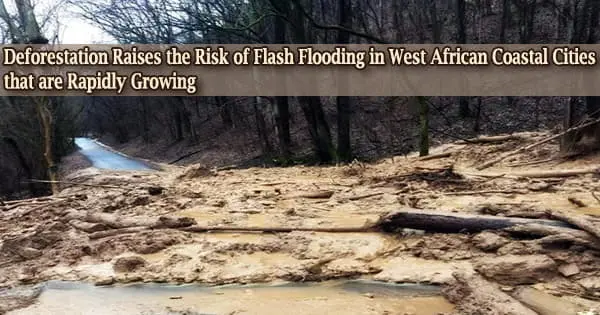According to a study, the frequency of thunderstorms has doubled in some fast-growing African coastal cities over the last 30 years, with much of this rise tied to the influence of deforestation on the local climate.
It is well recognized that clearing vegetation increases rainwater runoff and the likelihood of mudslides, such as the one that killed 1,100 people in Sierra Leone’s capital, Freetown, in August 2017.
However, new research led by the UK Centre for Ecology and Hydrology (UKCEH) has discovered that increased storm activity in coastal areas represents a second, previously unknown, way that deforestation might worsen flooding.
The study looked at three decades of satellite data in southern West Africa to see how deforestation had changed weather patterns by changing the heating and moistening of the atmosphere.
The deliberate clearance of forested terrain is known as deforestation. Forests have been razed throughout history and into modern times to make room for agriculture and animal grazing, as well as to obtain wood for fuel, manufacture, and construction.
The researchers discovered that clearing significant tracts of forest had aggravated the consequences of global warming in the region’s coastal areas, which include Guinea, Sierra Leone, Liberia, Ivory Coast, Ghana, and Nigeria.
Deforestation has had a significant impact on landscapes all around the world. Storm frequency has doubled in deforested areas since 1991, whereas it has increased by roughly 40% in forested areas.
The deforested terrain had been converted to agricultural and cooking fuel to sustain the adjacent rising population, but storms and the resulting rainfall had an impact on both urban and rural areas.
The most deforestation is currently taking place in tropical rainforests, supported by major road development into formerly inaccessible areas.
Around 40 percent of the world’s population lives within 100km of the coast, so increases in flash flooding causes disruption to millions of people’s lives. Our findings, therefore, provide a warning to fast-growing coastal cities across the world.
Professor Chris Taylor
Professor Chris Taylor of UKCEH, who led the study, published in the journal PNAS, says: “The extent of increase in coastal storm activity is likely to vary in different regions, depending on the local climate, but we would expect deforestation to have a similar effect in other coastal deforested areas.”
“Around 40 percent of the world’s population lives within 100km of the coast, so increases in flash flooding causes disruption to millions of people’s lives. Our findings, therefore, provide a warning to fast-growing coastal cities across the world.”
Because of the food and economic benefits that the sea brings, a large number of people reside near it.
Large sections of coastal tropical forest are being destroyed in Africa and Southeast Asia, global climate change is already affecting people, and drainage and other infrastructure are typically ill-equipped to deal with significant flooding.
Residents of Freetown, in particular, are already experiencing various, harmful effects of climate change, such as high temperatures and storm-related flash flooding.
Professor Taylor says: “Deforestation is exacerbating the impacts of climate change in some of the least resilient cities on Earth, making it much harder for these communities to cope with extreme weather events.”
Deforestation has been associated to lower regional rainfall in Amazonia in previous studies. The ocean, on the other hand, has a significant impact on local weather patterns, and this is the first study to look into the impact of deforestation on storm activity in coastal areas.
“Local weather patterns are dominated by sea breezes and deforestation strengthens these winds that carry moisture inland, triggering more afternoon downpours,” explains Dr. Cornelia Klein of UKCEH, a co-author of the study.
The study was part of UKCEH’s and partners’ ongoing research into past, current, and future climate change in West Africa, where flash flooding is becoming more widespread during the rainy season.
Professor Taylor led a study in 2017 that found global warming was responsible for a threefold increase in the frequency of extreme Sahel storms in just 35 years. The Natural Environment Research Council (NERC), which is part of UK Research and Innovation, financed the study.
Sarah Webb, NERC’s Associate Director for International, says: “COP26 highlighted significant challenges in many parts of the world caused by climate change.”
“Research funded by NERC is helping global communities make future decisions on sustainable land management, urban planning, and agricultural practices, as well as draw up emergency response plans. This is supporting them in adapting to, and mitigating, the effects of climate change, leading to greater resilience.”
















